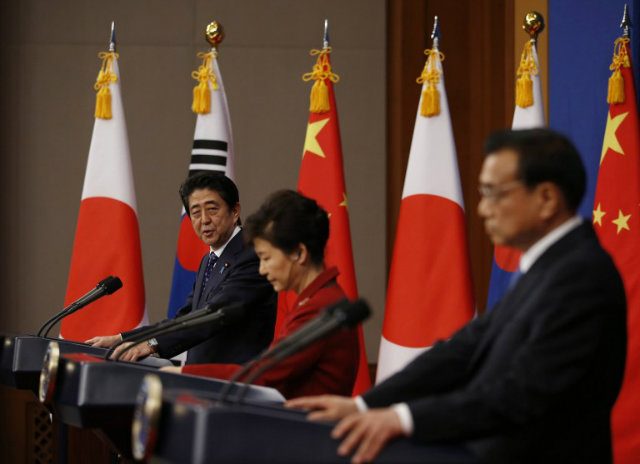SUMMARY
This is AI generated summarization, which may have errors. For context, always refer to the full article.

SEOUL, South Korea – The leaders of South Korea, China and Japan said on Sunday, November 1, they were willing to work together again for regional trade and security after setting aside historical animosities with their first summit talks in more than 3 years.
South Korean President Park Geun-Hye and Chinese and Japanese premiers Li Keqiang and Shinzo Abe discussed a wide range of topics, from free trade to the threat of North Korea’s nuclear weapons program, during a 90-minute sit down in Seoul.
There was no substantive breakthrough, with the meeting seen more as a symbolic statement of intent by Northeast Asia’s three largest economies to mend strained ties.
“We shared the view that trilateral cooperation has been completely restored on the occasion of this summit,” the leaders said in a lengthy joint statement.
They also agreed to put the three-way summits back on an annual footing, with the next to be held in Japan in 2016.
The three countries began holding annual summits seven years ago, but the souring of Japan’s relations with its two neighbours over issues dating back to World War II triggered a lengthy hiatus after the last one in 2012.
Boosting free trade
The focus on Sunday was very much on economic ties, with China especially keen to strengthen trade links as it tries to inject fresh momentum into its slowing economy.
The joint statement included a commitment to sealing a trilateral free-trade agreement that would provide a counterpoint to the new US-led Pacific trade pact of which China and South Korea are not members.
Also high on the agenda was North Korea, whose nuclear weapons ambitions worry – and threaten – all 3 countries including China, the North’s main diplomatic protector and economic benefactor.
The leaders reaffirmed their “firm opposition” to the development of nuclear weapons on the Korean peninsula as well as any action that could raise tensions or violate UN resolutions.
Pyongyang has recently hinted at a space rocket launch which would contravene a UN ban on its use of ballistic missile technology.
Addressing reporters after their meeting, Park said the summit had marked a “big step towards securing peace and prosperity” in Northeast Asia.
“It is our shared interest … and we have to firmly maintain our goal to denuclearise North Korea,” Park said.
The summit coincided with a visit by US Defence Secretary Ashton Carter to the Demilitarised Zone (DMZ) dividing the peninsula, during which he urged the North to avoid any future provocations.
Focus on Park-Abe summit
Park and Li had met for one-on-one talks on Saturday, but all eyes now will be on the South Korean president’s first-ever summit with Abe on Monday – a major step after an extended diplomatic freeze.
The rift has frustrated Washington, which would prefer its two key Asian allies – who last held a proper summit in 2011 – to focus together on containing an increasingly assertive China.
Relations between Seoul and Tokyo have never been easy — clouded by sensitive historical disputes related to Japan’s 1910-45 colonial rule over the Korean peninsula, especially the issue of Korean “comfort women” forcibly recruited to work in Japanese wartime military brothels.
Park, who took office in early 2013, had repeatedly refused to meet Abe, saying Japan had yet to properly atone for its past actions.
Japan maintains that all issues were settled in a 1965 normalisation agreement, which saw Tokyo make a total payment of $800 million in grants or loans to its former colony.
China has similarly bitter memories of Japanese wartime aggression and is also at odds with Tokyo over sovereignty of an island chain in the East China Sea.
“I hope this latest summit …. will contribute to peace and stability in Northeast Asia,” Abe said afterwards.
Sunday’s joint statement made no overt reference to the most sensitive issues, although it did stress the importance of “facing up” to history.
“We have agreed to look at history in a straightforward and future-oriented manner and properly handle sensitive issues, including historical ones,” said Li Keqiang. – Jung Ha-Won, Agence France-Presse/Rappler.com
Add a comment
How does this make you feel?
There are no comments yet. Add your comment to start the conversation.